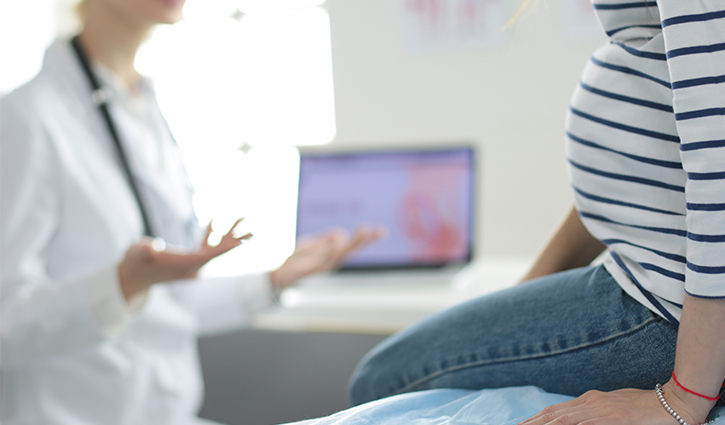

Pregnancy isn’t always like the images we see of beautiful women standing in a field of wildflowers, their gown billowing delicately around their bump in the breeze, as the sunset caresses the flawless, glowing skin of their serene face. In fact, it rarely is!
Pregnancy is exciting, wondrous, life-changing, emotional, and fascinating…but it’s also morning sickness, back pain, bladder and bowel problems, hair changes, itchy skin, stretchmarks, tiredness, insomnia, headaches, indigestion, heartburn, leg discomfort, vaginal discharge changes, and vaginal thrush.
And they’re just the more common pregnancy discomforts!
In this article, we’re going to look at vaginal thrush when you’re expecting, what causes it, how to prevent it, and how to treat it safely.
What is vaginal thrush?
Thrush is a yeast infection, usually caused by the ‘Candida albicans’ fungus. The symptoms include itching, irritation, a burning sensation, painful sex, and swelling of the vagina and surrounding area. Sometimes there will be a creamy white cottage-cheese like discharge.
Vaginal thrush is usually harmless, but it can be uncomfortable and some women experience recurring bouts of it.
What causes vaginal thrush?
Candida lives naturally in most vaginas without causing any symptoms, but thrush can be the result of an imbalance in ‘friendly’ bacteria. It can sometimes be passed on through sex (although it’s not a sexually transmitted disease).
Vaginal thrush during pregnancy
The good news is that there is no evidence that thrush affects your chances of getting pregnant, and it will not cause any problems to your baby. However, left untreated the infection can be passed onto your baby during vaginal birth.
During pregnancy, you are more likely to have thrush (and perhaps frequent bouts of it) thanks to the changes in female hormones, such as oestrogen.
You will also be more likely to have it if you’re prone to it when you’re not pregnant, or if you have diabetes or gestational diabetes. It can also develop if you take antibiotics for a different infection.
How to prevent vaginal thrush during pregnancy
- Wear breathable cotton or silk underwear rather than synthetic fabrics.
- Use natural, unperfumed detergent when washing underwear, and rinse twice to remove irritants.
- Avoid deodorised panty liners or pads. Change them regularly.
- Warm, moist environments are breeding grounds for overgrown bacterias and yeasts, so avoid tight restrictive clothing.
- Never douche, except if it’s specifically prescribed by your GP to treat an infection. There is no need to ever use vaginal deodorants or wash inside your vagina.
- Avoid soaps, bubble baths, body washes, talcs, and bath salts in the vaginal area. Instead use a natural, unperfumed soap.
- Always wipe from front to back after going to the toilet. Avoid scented toilet paper.
- Reduce processed foods and the amount of sugar you eat and drink. Try to eat a nutritious, balanced diet, and drink plenty of water.
How to treat vaginal thrush safely during pregnancy
- See your GP or midwife rather than buying over-the-counter anti-thrush medication from your pharmacy.
- You won’t be prescribed oral treatment because it can affect your baby.
- You may be prescribed an anti-thrush pessary for 3-7 days such as clotrimazole, nystatin, or miconazole. To reduce the risk of damage to your cervix, you might prefer to use your finger to insert the pessaries rather than the applicator.
- If the irritation and itching is around the vulva area, you may be prescribed an anti-thrush cream.
- Not all of these medications are safe to use at different stages of pregnancy so always confirm with your GP first.
- Avoid sex until after your treatment and the infection has cleared up. You partner may also need treatment if they show signs of infection.
- There is limited evidence as to the effectiveness of applying natural yoghurt onto the vaginal area, or taking probiotics to treat thrush, but some women find them helpful. Always talk to your healthcare professional before taking any supplements.























